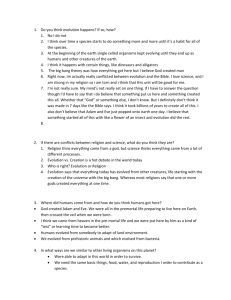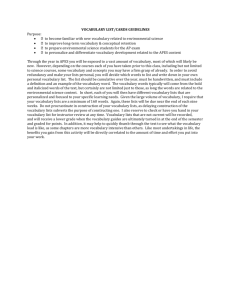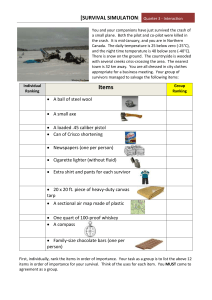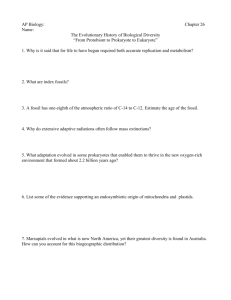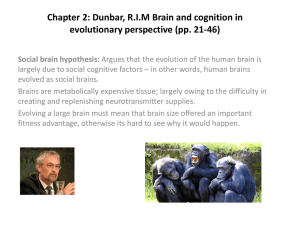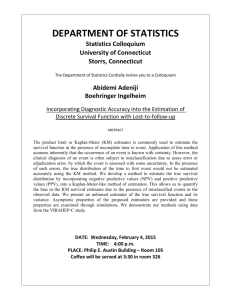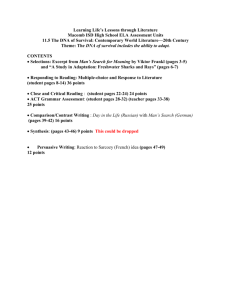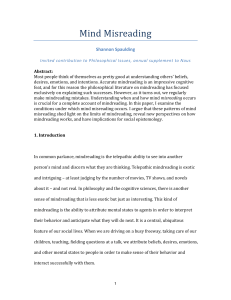1. Nature and Culture
advertisement
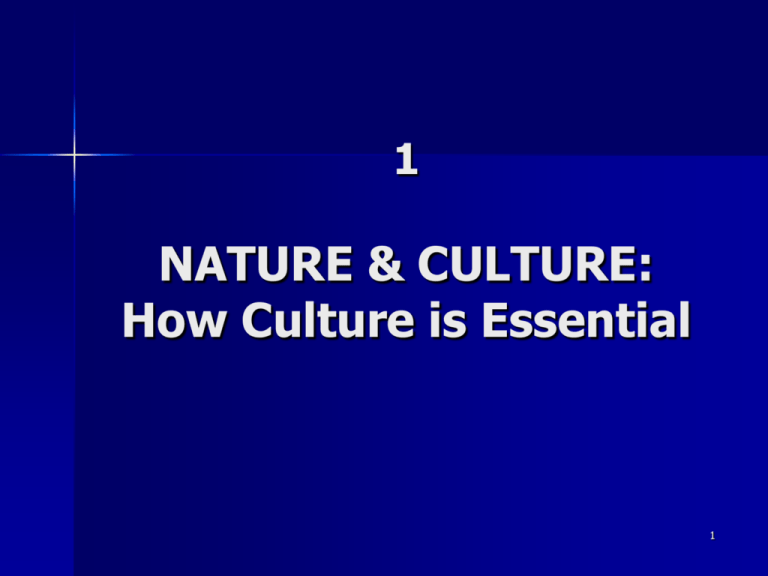
1 NATURE & CULTURE: How Culture is Essential 1 E.g.: Fact/data. USA. The South is more violent than the North. In the South men are more likely to kill an acquaintance than in the North. Yet the chance to be killed in a robbery doesn’t differ. Why? Because Southerners have acquired beliefs about personal honor that are different from Northerners, i.e. personal reputation is important and worth defending even at great danger. 2 Biological differences. Variations of levels of cortisol and testosterone hormones. Cortisol level increases in response to stress while testosterone level increases in preparation of violence. When insulted Southerners show much more increase in cortisol and testosterone than Northerners. Difference in beliefs between southern and northern people can be understood in terms of a difference in their culture and economic histories. 3 The difference cannot be explained in terms of contemporary socio-economic differences. It rests on an acquired difference in the set of beliefs transmitted from one generation to the other. Culture is part of biology We have an evolved psychology that shapes what we learn and how we think. This in turn influences the kind of beliefs and attitudes that spread and persist. 4 Fact: Why people don’t have sex in public? A penchant for sexual privacy seems to be part of human nature, not culture. Why? Mindreading Enable people to “see” themselves as others would see them. Perspective taking capacity. Self-awareness Exploited by culture. It’s detrimental to sex. 5 Human sex has become culturalized Culture shaped nature. Similarities between humans and animals Similarities reflect the input of nature while differences reflect the input of culture. Culture shaped our innate psychology 6 Culture (df.) Is information capable of affecting individual’s behavior that they acquire from other members of their species trough teaching, imitation, and other forms of social transmission. It is information-based: importance of knowledge and meaning in culture. Importance of the use of language. 7 Culture is in part a category or aspect of social life. Learned and transmission of behavior. In its essence culture is a world of sharable and transmissible meanings. It encompasses ideas and activities. Division of labor. 8 It doesn’t make sense to ask whether behavior is determined by genes or environment. Every organism is the result of interaction between genetic information and the properties of the environment. Genes are like a recipe, but the ingredients (temperature, cocking time, ….) are set by the environment. Culture is neither nature nor nurture, but some of both. 9 Not all processes shaping culture do arise from our innate psychology Culture itself is subject to natural selection. Culturally acquired ideas, values etc. affect what happens to people during their lives and in turn affect what gets transmitted from one generation to the other. Culture of honor arises (at least partly) because in lawless societies men who are not aggressive in protecting their herd and family tends to fall victim to ruthless predators. 10 Three different worlds in which we live 1. Physical environment: all organism need it in order to survive and reproduce. 2. Social world: superimposed on the physical world. It offers a better way to deal with the physical environment (joint action / cooperation: e.g. wolfs hunting). Hence the need of some inner psychological mechanism. 3. Cultural world: Culture is a better way of being social and a better way for survival and reproduction. 11 Evolution and Culture Since culture became such an evolutionary advantage it must be present in other species. Evolution doesn’t produce something out of nothing. Hence culture must have existed in our ancestors. Learned patterns of behavior passed down form one generation to the other (e.g. potato washing pattern among Japanese monkeys). 12 The beginning of culture can be found in other species It is thus plausible that it appeared before humankind did. The brain evolved to take advantage of society and culture. 13 There is a mixture of nature and culture The brain and culture developed together The brain must be powerful enough to manipulate language and it wouldn’t have evolved the way it did if it didn’t had to manipulate language. This offers a huge evolutionary advantage. 14 Culture vs. Cultural Differences It explains why culture can influence nature. It is a fallacy to equate the two (as many social scientists do). Cultural differences are not rooted in biological differences. The main difference is between culture and noculture, not between cultural differences, i.e. between e.g. the Canadian and the French populations (cf. language). 15 When nature recognized the value of speaking, humans appeared There are some form of “language” in other species and it must have been there among our ancestors. Human have been designed to capitalize on it. 16 Four classical views about the relationship between the individual and society 1. Conflicts and struggles Culture is inimical to human nature (e.g. wars). Why war? Freud’s answer People continue to develop culture because they are looking for ways of life which are bad for them (people have an innate death drive). 17 Freud’s view doesn’t match the facts of history. People are better of when they live in a cultural environment than when they live isolated or alone The cultural animal theory contrasts Freud’s theory inasmuch as it suggests that culture is what we are precisely suited for. 18 2. Culture as a Defense Mechanism Human are beasts like other species but with a superior intelligence. Intelligence produced the knowledge that we are mortal which is profoundly upsetting and the source of existential terror. Culture is the antidote: We can live beyond our individual bodies and achieve a sense of immortality. 19 But people know they’re mortal in virtue of cultural learning. Thus there must be some amount of culture in place before the knowledge of death. Furthermore, existential terror doesn’t suffice to explain the whole of culture since people produce culture even when they don’t think about death. Hence the fear of death is not the only mechanism generating culture. 20 3. Culture and the Tabula Rasa Culture shape the individual: people qua product of culture and socialization (vs. nativisme). But cultural differences conceals profound similarities (remember culture vs. cultural differences). 21 E.g.: gender differences. The feminist movement of the 1960s suggested that gender identity is culturally shaped. This runs against the facts: a boy raised as a girl after a circumcision went wrong (even with the help of hormones) didn’t developed a desire toward men. E.g.: communism. Even if it got all the tools (propaganda, media control, education, …) it didn’t succeed to create ideal communist individuals. Culture only succeeds insofar as it can accommodate the innate tendencies built into human nature. 22 4. Culture qua By-Product of Intelligence Brains evolved to deal with the physical environment. As a side effect human became smart enough to generate culture by copying each other’s innovations. For what exactly are big brains designed? 23 If brains evolved to solve problems, then larger brains should deal better with those problems. This runs against the facts. Species with larger brain do not necessarily solve problems better. Bigger brains go with more complex social worlds: this show that the brain evolved mainly for enabling animals to deal with their conspecifics. The longer the animal spends in social learning the larger the brain is. This suggests that the purpose of the large brain is to maximize social learning. 24 Evolution made us for culture Are people better suited for any other form of life? No Our psyches are innately programmed by nature specifically to participate in culture and society, i.e. the human psyche emerged because natural selection redesigned the primate psyche to make it more suitable for living in a cultural society. 25 The Biological Advantage of Culture The human brain accounts for only the 2% of the body mass. Yet it consumes 20% of the calories that an average person takes in. Since the brain: (i) is such an expensive organ to have and maintain, and (ii) it co-evolved with culture, culture must offer substantial advantages over other mechanisms. 26 Culture must ultimately be measured in biological terms, i.e. survival and reproduction (i) People have been extremely successful at reproducing. (ii) People success of survival dramatically improved in industrialized nations. 27 The Advantages of Culture 1. Progress: it can be accumulated across generations. Merely social animals don’t accumulate knowledge. Big difference between human and other species (e.g. highly social species like wolfs didn’t progress in the last 10000 or 100000 years, while we did). 28 The ratchet effect (Tomasello) comparison with the tool permitting forward movements while preventing backward ones. For progress to succeed two things are needed: (i) innovation (one must come out with some novel and better solution to a common problem), and (ii) preservation (the solution has to be transmitted and remembered). 29 Progress: Apes vs. Humans Apes are quite good in finding new solutions, but they are incapable of preserving and transmitting them. Cultural knowledge is stored in the collective rather than in the individual minds. Without progress the new generation would have to reinvent everything (e.g. how to make fire, how to build tools, …). A natural disaster (e.g. the Black Death in Europe) can kill most of the people. Yet the culture’s stock of information survived merely because few people did. 30 Division of Labor Nonsocial animals cannot profit from the division of labor. Social animals which are not cultural can divide up labor in some ways. Cultural animals can divide up labor extensively (e.g. assembly line of the industrialized society) so that every one becomes an expert in what s/he does. With specialization we have better performances. Concerning the division of labor human uniqueness is a matter of degree, not of kind. 31 Culture is a System Insofar as nature designed us for culture, it prepared us to be part of a system. Systems connect multiple individual points (nodes). Thus the total is more than the sum of its parts. If all the nodes were the same, doing the very same thing, we would not have much of a system. We would have a mere collectivity of identical nodes. 32 Systems linking together nodes doing different things can be extremely powerful and produce huge gains in productivity. group vs. individual biological altruism vs. biological egoism psychological altruism vs. psychological individualism (cf. Sober & Wilson’s Unto Others). 33 Language/Meaning and Culture Language is not a private activity (cf. Wittgenstein’s private language argument). For one to be capable of using language one must be part of a culture. Just as language is only possible via a culture, a culture always involve language. For culture relies on meaning and language is the principal tool for meaning. Language and culture are just two sides of the same coin. 34 The importance of language Language allows the storage and transmission of information Disputes can be solved in talking rather than fighting Language permits to live in time (to have a time perspective, to distinguish the past from the future) 35 Animals don’t import the past into the present E.g.: rats can only connect the past with the present for few second; they are thus prevented of learning and undertake great deal of tasks. In contrast a human beings can make choices based on past information and event which occurred before one’s birth. This also allows to evaluate short term benefits vis-à-vis long terms ones (e.g. agriculture would be impossible without that). 36 Abstract reasoning (e.g. logics and mathematics) would be impossible without language. Without the cultural use of meaning via language, rationality could not be imposed on systems (e.g. division of labor in factories). Planning would be impossible without language. … 37 Cultural Apes How did Nature designed cultural apes? Success and failure is judged in terms of the survival of the species. Because of survival, Why are we not immortal? 38 Nature choose reproduction over immortality because aging and death are inevitable. Hence the choice of reproduction for the survival of the species. Biology has its limits. It is thus in the need of finding a good balance (e.g. an unlimited intelligence would require an unlimited brain which would consume an unlimited quantity of energy to the detriment of other biological organs). 39 Cultural animals Must be capable of mindreading. Without it the sharing of knowledge and the transmission of culture would be impossible. Must have a cultural brain, i.e. a brain capable of storing a good amount of information. 40 Must have a lengthy socialization process enabling them to learn the culture’s knowledge and the rules for behavior in the society. Must have an extended childhood permitting the transference of culture by education. Hence there must be a behavioral plasticity trough life and in particular trough the juvenile period. 41 Must have a sophisticated decision-making process. Must have free will. Nature must create a gap between causes and effects (controlled processes). For noncultural animals and organisms automatic processes may be sufficient to guide behavior. For us the behavioral outcome must be chosen. Must be capable of self-control. 42
